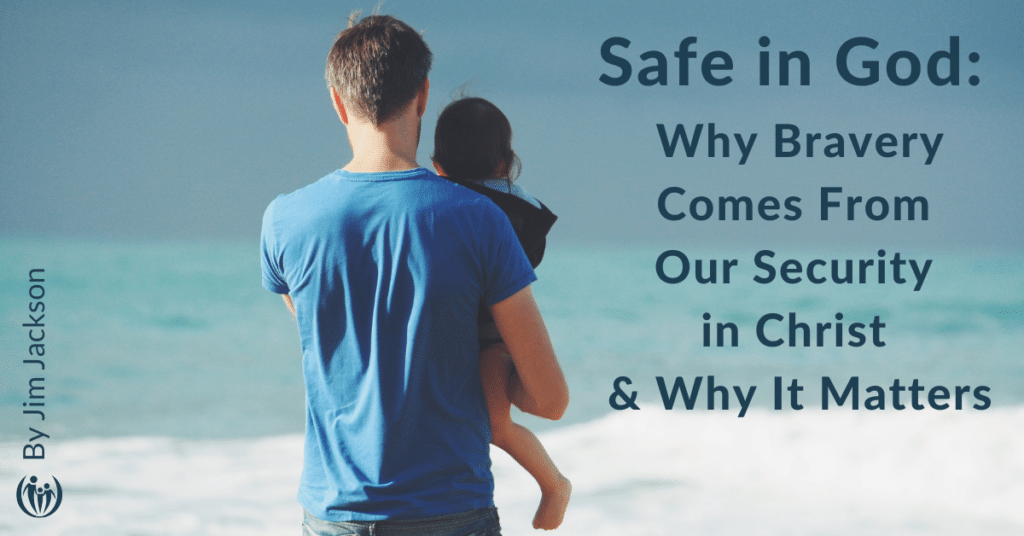
Safe in God: Why Bravery Comes From Our Security in Christ & Why It Matters

Is God safe? Are we safe in God?
When I think about the giants of the Christian faith, “safe” isn’t the first word to describe their walks with God. From the martyrdom of Jesus’ early disciples to the countless followers of Jesus who have sacrificed their comfort and safety to serve others, God frequently calls His people out of safety into very uncomfortable and sometimes downright dangerous situations. So, does God value safety? And if not, how does it impact our parenting? And if God does, why doesn’t our walk with God always look safe?
We found ourselves contemplating this when we received this excellent theological question from David, a long-time member of the Connected Families community. He questioned why we had ‘You are SAFE with me’ as the foundational message for parents to communicate to children.
Here is his question:
“Why is ‘safe’ the foundation to work with? I feel like it is important, but why #1? When I think back to Psychology 101, I remember safety is the base of Maslow’s hierarchy of needs to work toward self-actualization. And I know in Scripture God is giving us His peace, and His presence… but I feel like God doesn’t start with the message that He is ‘safe’”
This is a good and deep question with a good and deep answer! Since we don’t have space for a theological deep dive here, we’ve broken it down into a few digestible chunks.
The brief practical answer: God gave us brains that require emotional safety for learning and bravery
Simply stated, we start with safety because we know that in order for kids to learn their best, their brains must be alert but calm. They must feel safe.
Too many parents discipline their kids in ways that put their kids’ brains on the defensive, making them feel unsafe. When this happens, the learning they do in this brain state is self-defensive. The trust needed for kids to absorb their parents’ most important teaching is eroded. In our over twenty years of working with children and families, we know of no confident, courageous followers of Jesus who did not first feel emotionally safe with someone else.
The brief theological answer: We are safe in God, even in dangerous situations
Theologically addressed, this is a bit more complex. It’s true God asks us to do dangerous things sometimes, but God doesn’t change. We are still emotionally safe, even when we mess up or are in the midst of life’s hardest tragedies, because our circumstances never diminish our security in Christ. God is still God in these dark and dangerous places, and we get to rest confidently in God’s absolute goodness and undying love, even when terrible things happen.
“When you pass through the waters, I will be with you; and when you pass through the rivers, they will not sweep over you. When you walk through the fire, you will not be burned; the flames will not set you ablaze. For I am the LORD your God, the Holy One of Israel, your Savior” Isaiah 43:2,3a
We embrace safety as the foundation for spiritual growth based on early teaching from a trusted (we felt safe with him) mentor. He would frequently go into “dangerous” places to confront entrenched legalism in churches, fueled by the belief that:
“We are so alive because of Christ’s work on the cross that you could shoot our chest full of holes and not take away our life; that God’s presence is so safe and secure that no earthly danger can harm us. We are safe by faith!”
From this foundation of security in what Christ secured for us at the cross, we can go into all kinds of dangerous places in the world without fear. When believers embrace this security by faith, knowing they are safe in God’s eternal care, they can boldly pursue the “work God prepared in advance for them to do!” Ephesians 2:10
If we want our children to experience this bold, brave sense of safety with God, we must first live it out. We can do this by both experiencing it and then passing it on and being emotionally safe for our kids.*
David was safe with his Father. He invites God to search his heart and look for anxiety or anything offensive – an essential process of cleansing and spiritual growth. What a vulnerable invitation! No one would do that without feeling really safe with God. Just like us with our children, David’s rich intimacy with God was rooted in his safety in that relationship. Psalm 139:23, 24
*If you’re struggling to experience the safety of God in a way you can pass on through safety with your children, you may want to consider parent coaching.
When kids perceive their parents as warm, tolerant, accepting, open, and nurturing, their kids are far more likely to embrace their parents’ religious beliefs.
Vern Bengston
Research-affirmed answer: Safe parents pass on their faith
Research by Vern Bengston in his book Families and Faith: How Religion is Passed Down Across Generations shows convincingly that when kids perceive their parents as warm, tolerant, accepting, open, and nurturing, their kids are far more likely to embrace their parents’ religious beliefs.
This research confirms our experience. The parents who are most likely to pass their faith on well…
- love unconditionally
- seek wisdom for challenges
- are slow to speak and quick to listen when anger flares
- win their children’s trust with faithfulness
- earn respect through humility, not dominance
- apologize well
- encourage dialogue and problem-solving instead of imposing judgment
We call the combination of these things “safety.” Our experience bears testimony to the impact of this over time. When we meet young adults who say their parents demonstrated these ways of being safe, they show a deep respect for their parents and their parents’ faith (even if they are still sorting out their own faith convictions).
Volumes could be written about these brief descriptions (and I wrote pages before narrowing this for ease of reading). In the work to answer this dad’s question, I am more convinced than ever that if you want your kids to learn what you want to teach them, ensure they feel safe with you first. And if you want your kids to feel safe, first spend some time reflecting on what it means to be safe with God in all situations.
© 2024, 2015 Connected Families
Ready to dive in and learn more about the Framework?
Our 8-session online course, Discipline That Connects With Your Child’s Heart will guide you through each level of the Framework. If you’re looking for a grace-filled way to parent, this course is for you!





